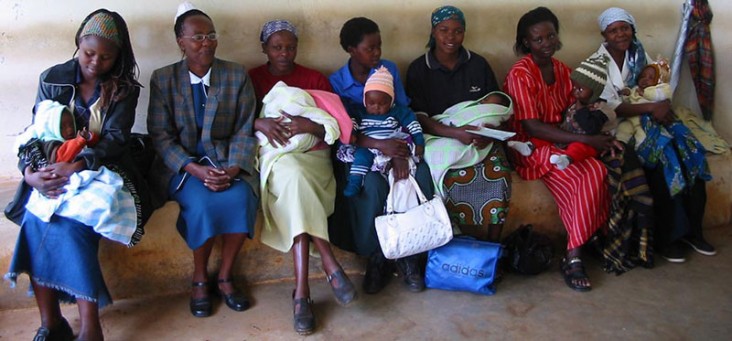- What We Do
- Agriculture and Food Security
- Democracy, Human Rights and Governance
- Economic Growth and Trade
- Education
- Ending Extreme Poverty
- Environment and Global Climate Change
- Gender Equality and Women's Empowerment
- Global Health
- Water and Sanitation
- Working in Crises and Conflict
- U.S. Global Development Lab

Implementation science is used to identify, develop and measure the impact of innovative strategies to improve HIV service delivery, to inform policies and programs and to ultimately strengthen the global response to the HIV epidemic. The Implementation Science Branch in the U.S. Agency of International Development’s (USAID’s) Office of HIV/AIDS (OHA) provides technical leadership for research and evaluation to assess and improve HIV and AIDS service delivery, interventions and products in real-world settings through implementation science programming.
USAID HIV Implementation Science Objectives:
- Promote USAID’s research agenda for HIV implementation science, operations research and evaluation, working in close collaboration with research partners, implementers and policymakers.
- Support capacity building and sustainability through collaboration with research platforms and the creation of enduring partnerships in developing countries.
- Promote data dissemination and translation of research results into policies and programs.
USAID, through the U.S. President's Emergency Plan for AIDS Relief (PEPFAR), supports a number of research partners to carry out implementation science research that cuts across a range of HIV prevention, care and treatment priority areas, including pediatric care and treatment; gender; positive health, dignity and prevention; health systems strengthening; and voluntary medical male circumcision.
Current Implementation Science Research Mechanisms
Implementation Science Research Supports Programs under PEPFAR
USAID released the Annual Program Statement (APS) "Implementation Science Research to Support Programs under PEPFAR" to support the PEPFAR’s investment in implementation science. The APS supports studies that strengthen the integration of HIV programs across the prevention, care and treatment continuum. USAID currently supports 10 studies in 9 countries throughout sub-Saharan Africa under the APS, with 7 studies completed in 2016.
HIVCore Project
HIVCore supported research that sought to improve the efficiency, effectiveness, scale and quality of HIV and AIDS treatment, care and support, and prevention of mother-to-child transmission programs by conducting operations research and focused evaluations and promoting research utilization.
Project Supporting Operations AIDS Research (Project SOAR)
Project SOAR conducts operations research that determines how to best address challenges and gaps in the delivery of HIV and AIDS care and support, treatment and prevention services with the goal of improving HIV and AIDS program outcomes. Project SOAR’s objectives are to produce a robust body of evidence to ensure that increasingly constrained resources are used efficiently and effectively to reach those most in need; improve use of high-quality HIV services through the promotion of best practices informed by Project SOAR; and strengthen the capacity of local partners to develop research proposals, conduct operations research, assess key findings and disseminate results. This 5-year project (2014–2019) supports more than 48 diverse research activities.
Promoting the Use of Research Findings
OHA supports the publication and promotion of research findings to inform programs and policies. OHA has supported several recent journal supplements to share our partners’ work:
- HIV Risks and Vulnerabilities among Key Populations in West and Central Africa – Evidence to Inform HIV Prevention, Treatment and Care, Journal of Acquired Immune Deficiency Syndrome, 2015
- Lessons learned and Study Results from HIVCore, an HIV Implementation Science Initiative, Journal of Acquired Immune Deficiency Syndrome, 2016
- Voluntary Medical Male Circumcision for HIV Prevention: New Mathematical Models for Prioritizing Sub-populations by Age and Geography, PLoS, 2016
- Impact of Health Communication on HIV Treatment Outcomes, Journal of Acquired Immune Deficiency Syndrome, 2017
Study Resources
- Issue Brief: Evaluation of South Africa’s National Female Condom Programme [PDF, 1.2MB]
- Issue Brief: Strengthening Linkage to and Retention in HIV Care in Mozambique [PDF, 431KB]
- Issue Brief: Maximizing HIV-Free Survival for Children in Kigali, Rwanda [PDF, 2.3MB]
- Issue Brief: Health Benefits of Linking Women to Cervical Cancer Screening in Zambia [PDF, 641KB]
- Issue Brief: Accelerating Adults' Entry into HIV Care in South Africa [PDF, 618KB]
- Issue Brief: Integrating Delivery of ART and PrEP: A Win-Win for Public Health and Serodiscordant Couples [PDF, 605KB]
- Success Story: Mitigating Stigma in HIV Services for Key Populations in Senegal
- Kabeho Study Blog by Elizabeth Glaser Pediatric AIDS Foundation







Comment
Make a general inquiry or suggest an improvement.